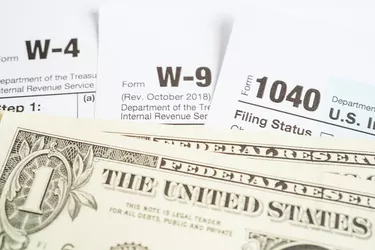
With telephone wait times of 19 minutes or higher, an Internal Revenue Service (IRS) telephone representative can be difficult to reach. And if you're on notice for delinquent taxes and need to set up payment plans, this can be frustrating.
The IRS recently announced an alternative for qualified taxpayers. But is this new method easier than speaking to a person?
Video of the Day
Video of the Day
IRS Announces AI Voice Bots
The IRS has expanded its use of voice bots. Powered by artificial intelligence (AI), the voice bots let the caller hear an interactive voice response. The IRS started using voice bots in January 2022. These are available in both English and Spanish.
In June 2022, Darren Guillot, deputy commissioner of small business/self-employed operations support, explained that expanding the use of voice bots with callers, would free up many IRS representatives so that they can help taxpayers with more complex issues.
IRS Commissioner Chuck Rettig stated that this was part of a broader effort to improve the taxpayer experience. Rettig said that this would shorten telephone wait times and help people avoid making a second call to accomplish their goal.
As of June 2022, the IRS voice bots had answered three million calls.
Voice bots are an option that is offered to qualified taxpayers who call the Automated Collection System or Accounts Management phone lines. They can set up payment plans and authenticate their identities through a PIN creation process.
Once the voice bots have identified the caller as the legitimate taxpayer on the notice through the number, the voice bot will set up payment plans for the taxpayer.
Voice Bots Authenticate Taxpayers
Although the AI voice bots were launched in early 2022, it wasn't until June that they could authenticate a taxpayer's identity. These authenticated bots allow eligible taxpayers to set up payment plans for delinquent taxes.
How Do Voice Bots Authenticate Callers?
When taxpayers are delinquent in paying taxes, they receive a tax bill. The notice for the tax bill that the taxpayer receives has a number on it. This number and other personal information are used on notice questions for the IRS voice bots.
Setting Up Payment Plans With IRS Voice Bots
Once the voice bots have identified the caller as the legitimate taxpayer on the notice through the number, the voice bot will set up payment plans for the taxpayer.
Payment plans are agreements with the IRS to pay delinquent taxes in a specified timeframe. Based on the taxpayer's needs, a voice bot will set up a plan to have the tax debt paid in full within 72 months.
The IRS voice bots can only set up plans for eligible taxpayers. In order to set your payment plan up with a voice bot, you must owe less than $25,000. If you're over that amount, you'll need to speak to a telephone representative.
Other Areas Voice Bots Help
The Economic Impact Payment phone lines are also manned by IRS voice bots. They can give the taxpayer procedural responses to FAQs.
The Advance Child Tax Credit phone lines started using AI voice bots in February 2022. The voice bots were able to help callers reconcile credits on their 2021 tax returns.
IRS to Rollout More Voice Bots Services
Taxpayers with established or newly created PINs will soon have other voice bots services. For example, they will be able to get payment history and the current balance owed. Callers will also be able to order account and return transcripts.
Toll-Free Lines for IRS
For general questions, you can reach the IRS at 1-800-839-1040. The benefit of the IRS voice bots is they can be reached outside of regular business hours.
If you are having a difficult time reaching the IRS about your owed taxes, you might want to contact the National Taxpayer Advocate Service.